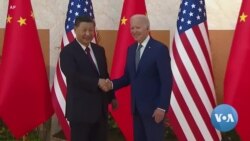U.S. President Joe Biden and Chinese leader Xi Jinping meet in-person for the first time.
Welcome to VOA Asia Weekly. I'm Chris Casquejo in Washington. That story is coming up, but first, making headlines.
North Korea fired a ballistic missile on Thursday as it warned of "fiercer military responses" to U.S. efforts to boost its security presence in the region with allies Japan and South Korea.
Leaders of the Group of Seven met for an emergency meeting Wednesday morning on the sidelines of the Group of 20 summit in Bali, Indonesia to discuss the explosion in eastern Poland that killed two people. Poland's president called it an "unfortunate accident" and NATO's secretary-general said a preliminary analysis pointed to a Ukrainian air defense missile that had been fired at an incoming Russian missile.
Also at the G20 summit, the Director of the World Trade Organization Ngozi Okonjo-Iweala on Wednesday warned that several major economies could face recession due to the economic impacts of the war in Ukraine, but did not name any specific countries.
Indonesian President Joko Widodo and his Chinese counterpart Xi Jinping held a bilateral meeting on Wednesday after the G20 summit. They watched a video of a test of the $7.8 billion dollar Jakarta-Bandung high-speed railway, which is scheduled to open next June. Xi hailed the Beijing-backed project as a model for developing nations and cooperation with China.
Japanese Prime Minister Fumio Kishida met Chinese President Xi on Thursday on the sidelines of the Asia Pacific Economic Cooperation, or APEC, meeting in Bangkok as tensions in Asia have flared regarding Taiwan and North Korea. Kishida said he hoped to build constructive, stable relations with China after he criticized China earlier in the week for repeated incursions into islands in the East China Sea that both countries claim.
U.S. President Joe Biden met with Chinese leader Xi Jinping Monday, on the sidelines of the G20 Summit for three hours, the first in-person meeting between the leaders of the world’s two largest economies. VOA’s Chief White House Correspondent Patsy Widakuswara traveled with the president and has this report.
The resort island Bali, Indonesia, is the setting for the highly anticipated summit of the superpowers. U.S. President Joe Biden and Xi Jinping, his Chinese counterpart.
Amid heightened tensions, both leaders stressed the need to manage differences and avoid conflict.
"We, as the leaders of China and the United States, should play a role in guiding and setting the directions so as to find the correct direction for the development of the relations between our two countries."
In the meeting that lasted over three hours, Biden said he sought to lower tensions over Taiwan, a self-ruled island Beijing considers its breakaway province.
“I do not think there's any imminent attempt on the part of China to invade Taiwan, and I made it clear that our policy on Taiwan has not changed at all. It’s the same exact position we've had. I made it clear that we want to see cross-strait issues peacefully resolved.”
Biden said if Beijing is not able to rein in North Korea, the U.S. would move to further protect its allies in the region.
Earlier Monday, Biden met President Joko Widodo, host of the G-20 summit, a gathering of leaders of the world's 20 largest economies.
"As I told you, Mr. President, I don't think I'm going home."
Patsy Widakuswara, VOA News, Bali.
U.S. Vice President Kamala Harris attended the APEC summit in Bangkok at the end of the week. She’s visiting the Philippines next week.
Visit voanews.com for the most up-to-date stories. You’re watching VOA Asia Weekly.
With Republicans now projected to take control of the U.S. House of Representatives, some of them are calling for a change in the longstanding U.S. policy of strategic ambiguity regarding Taiwan to what they call strategic clarity.
“I don't think Taiwan is moving towards a declaration of independence, but I do see Xi Jinping increasingly comfortable with risk taking moves in foreign policy. I see deterrence in the Taiwan Strait weakening. And so in my view it's important to reinforce deterrence and one part of that equation is shifting to strategic clarity so that there's no doubt in Xi Jinping's mind or in the Chinese leadership's mind that we would come to Taiwan's defense in the event of an unprovoked attack on Taiwan.”
Taiwan’s foreign ministry said on Tuesday that strategic relations with the U.S. and defense capabilities will keep improving after U.S. President Biden reiterated his support for stability in the Taiwan Strait in his meeting with Chinese President Xi.
Thanks for watching VOA Asia Weekly. I’m Chris Casquejo. Until next week.











